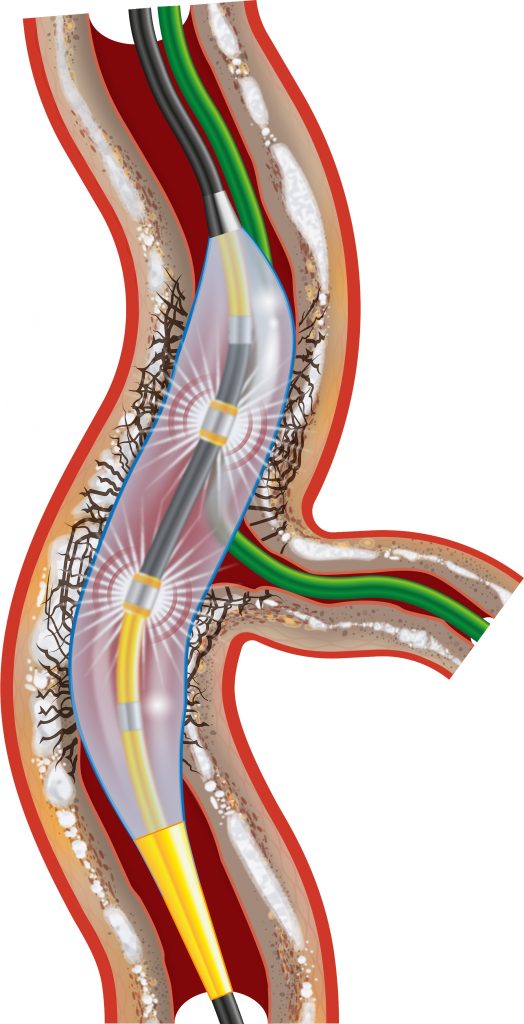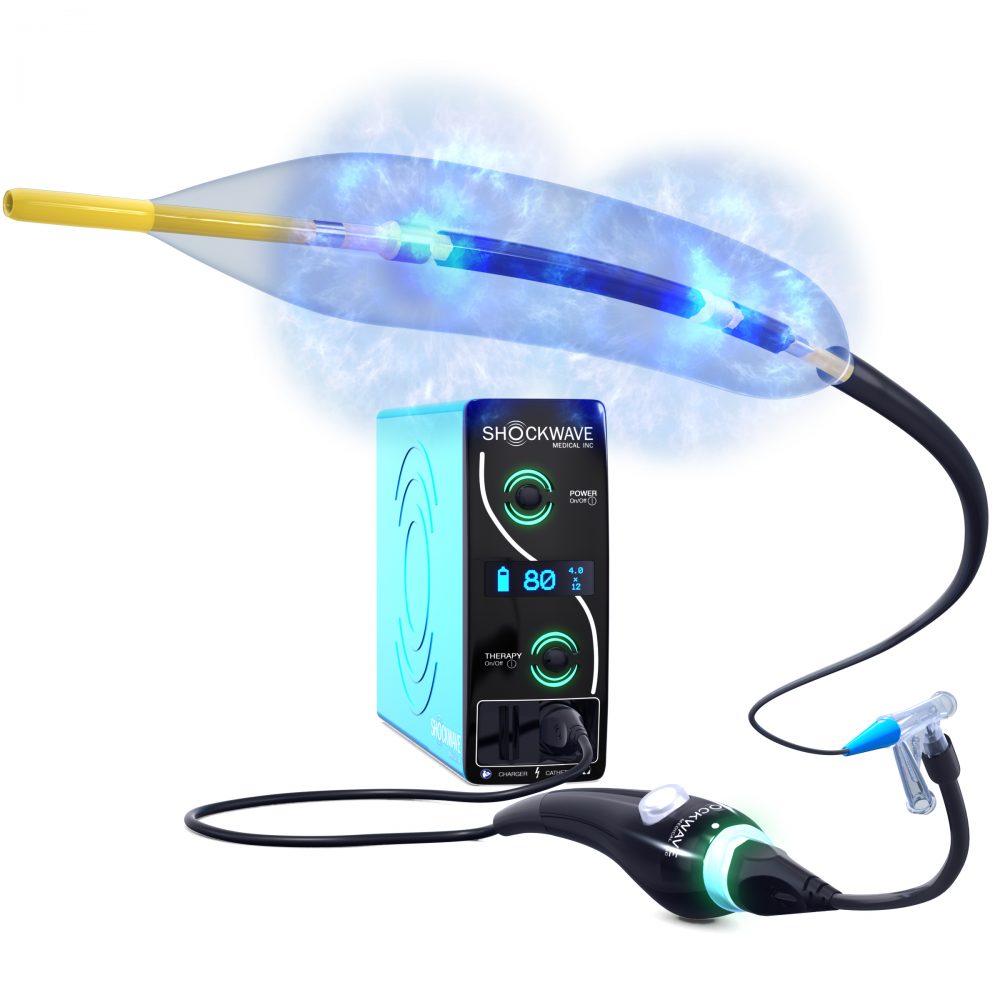New “Shockwave” Therapy Option for Blocked Arteries
Deborah Heart and Lung Center has added Shockwave therapy to its arsenal for breaking up calcium deposits in both coronary and peripheral arteries.
Each year, approximately one million patients undergo a stent procedure in order to open up an obstructed coronary artery in order to increase and restore normal blood flow to the heart. About 30% of those cases are more complex because the patient has developed calcium build-up in their arteries, which is often a part of the atherosclerotic process (buildup of cholesterol plaque in the artery). These calcium deposits, which develop slowly over time, harden into a bone-like state. For patients who need a stent, this hard calcium makes the procedure more complex, as it becomes more difficult to fully open or expand the artery to make room for the stent. The presence of heavy calcification also makes the artery more likely to dissect (split or tear) while trying to stretch it open with a balloon. Some arteries are so heavily calcified that they can’t be opened at all.

“Traditionally we first open up blocked arteries with a balloon catheter to make room for the stent. Using balloons to crack the calcium often requires very high inflation pressures which can potentially tear or dissect the vessel. We also have many types of atherectomy catheters which are used to remove plaque from the arteries in order to create a channel through the blockage; some of these are specifically designed to remove calcium from the inner lining of the blood vessel,” said Richard Kovach, MD, Division Director of Deborah’s Interventional Cardiology Program. “However, balloons and atherectomy catheters are not ideal for addressing heavy calcium deep within the walls of the blood vessels.”
Shockwave therapy offers an alternative.
“Shockwave therapy uses a new application of lithotripsy, an innovative technology that uses high frequency focused ultrasonic waves to break up the calcium. Many people are familiar with this approach, which is also used to break up kidney stones,” said interventional cardiologist Daniel Ice, MD, who was a principal investigator for the Shockwave therapy clinical trial at Deborah. That trial’s successful outcome helped pave the way for FDA approval last year. “This intravascular lithotripsy, or IVL, technology uses ultrasonic pressure waves to break up or fracture the problematic calcium. Following lithotripsy, a stent can then be more safely and fully deployed to restore the artery to its normal diameter. It is important to understand that the fractured calcium stays within the walls of the blood vessel, and does not “shower” calcium particles downstream, which would plug up smaller branch vessels. Instead, fracturing the calcium softens it up just like a jack hammer would fracture and soften up a slab of concrete. This makes the blood vessel much more compliant or pliable, allowing for full balloon inflation and stent deployment.”
“Being able to fracture the calcium with this new technology is an exciting new chapter in the treatment of heart disease in some of our most complex patient cases,” added Dr. Kovach. “The practice of using balloon catheters to stretch open arteries has been around for over 30 years; when combined with stenting, it is still a mainstay in the treatment of occluded arteries. However, it is the constant advancement of technology and adjunctive tools such as Shockwave lithotripsy that allows us to treat ever more complex and seriously ill patients without surgery. Deborah is a dedicated cardiovascular center training tomorrow’s interventional cardiologists and treating the most complex patients in the region. As such, we are fortunate to have all the latest cutting edge technologies commercially available to offer our patients, as well as even more advanced technologies available only through our research programs.”

Dr. Ice agreed. “It was exciting to work on the clinical trial investigating this innovative technology. Severe calcification within the blood vessels and other cardiac structures is becoming more common as people live longer. Calcium has always been very challenging to manage and treat. The ability to break up calcium in a safe and effective way will allow us to treat many more patients with complex coronary artery disease.”
Deborah’s clinical research department’s groundbreaking work on new and exciting technologies allows for the hospital’s patients early access to innovative treatments.
“We are fortunate to have access to brand-new, life-saving techniques,” added Ice. “The best part is that when you have something like Shockwave — that is successful in clinical trial — and then moves to an approved treatment, we already have the experience and knowledge to quickly make these products available to our patients.”
Deborah Heart and Lung Center in Browns Mills, NJ is an 89-bed teaching hospital that specializes in the prevention, diagnosis, research, and treatment of heart, lung, and vascular diseases. Founded in 1922, Deborah has been a regional and nationally recognized leader throughout its 100-year history, during which time it has healed 2.3 million patients from every corner of the United States and 87 countries in the world. From performing the first open heart surgeries (adult and pediatric) in New Jersey, to running one of the highest volume left-ventricular assist device (LVAD) implant programs in the region, Deborah has stood at the forefront of medical innovation, all while never wavering from its founding mission “there is no price on life.” Deborah is consistently recognized as a leader in patient care from the Centers for Medicare and Medicaid Services, ranked among the top hospitals in New Jersey for patient satisfaction; holds a top-tier Society of Thoracic Surgeons rating which places Deborah among the best cardiac surgery programs in the country; and is designated a national Top Teaching Hospital by The Leapfrog Group. Deborah is an Alliance member of the Cleveland Clinic Heart, Vascular & Thoracic Institute.